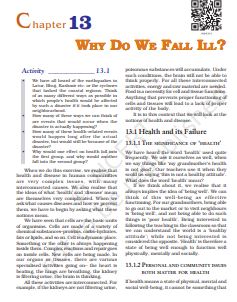‘NCERT Solutions for Class 9 Science Chapter 13‘ PDF Quick download link is given at the bottom of this article. You can see the PDF demo, size of the PDF, page numbers, and direct download Free PDF of ‘Ncert Class 9 Science Chapter 13 Exercise Solution’ using the download button.
NCERT Class 9 Science Textbook Chapter 13 With Answer PDF Free Download

Chapter 13: Why Do We Fall ill
13.1.1 The Significance of ‘HEALTH’
We have heard the word ‘health’ used quite frequently. We use it ourselves as well when we say things like ‘my grandmother’s health is not good.
Our teachers use it when they scold us saying ‘this is not a healthy attitude’. What does the word ‘health’ mean? If we think about it, we realize that it always implies the idea of ‘being well’.
We can think of this well-being as effective functioning. For our grandmothers, being able to go out to the market or to visit neighbors is ‘being well’, and not being able to do such things is ‘poor health’.
Being interested in following the teaching in the classroom so that we can understand the world is a ‘healthy attitude’; while not being interested is considered the opposite.
‘Health’ is therefore a state of being well enough to function well physically, mentally, and socially.
13.1.2 Personal And Community Issues Both Matter For Health
If health means a state of physical, mental, and social well-being, cannot be something that each one of us can achieve entirely on our own.
The health of all organisms will depend on their surroundings or their environment. The environment includes the physical environment. So, for example, health is at risk in a cyclone in many ways.
Human beings live in societies. Our social environment, therefore, is an important factor in our individual health.
We live in villages, towns, or cities. In such places, even our physical environment is decided by our social environment.
Consider what would happen if no agency is ensuring that garbage is collected and disposed of.
What would happen if no one takes responsibility for clearing the drains and ensuring that water does not collect in the streets or open spaces?
So, if there is a great deal of garbage thrown in our streets, or if there is open-drain water lying stagnant around where we live, the possibility of poor health increases.
Therefore, public cleanliness is important for individual health.
We need food to be healthy, and this food will have to be earned by doing work. For this, the opportunity to do work has to be available.
We need to be happy in order to be truly healthy, and if we mistreat each other and are afraid of each other, we cannot be happy or healthy.
Social equality and harmony are therefore necessary for individual health. We can think of many other such examples of connections between community issues and individual health.
13.1.3 Distinctions Between ‘Healthy’ And ‘DISEASE-FREE’
If this is what we mean by ‘health’, what do we mean by ‘disease’? The word is actually self-explanatory – we can think of it as ‘disease’ – disturbing ease.
Disease, in other words, literally means being uncomfortable. However, the word is used in a more limited meaning.
We talk of disease when we can find a specific and particular cause for discomfort.
This does not mean that we have to know the absolute final cause; we can say that someone is suffering from diarrhea without knowing exactly what has caused the loose motions.
| Author | NCERT |
| Language | English |
| No. of Pages | 13 |
| PDF Size | 1562 KB |
| Category | Science |
| Source/Credits | ncert.nic.in |
NCERT Solutions Class 9 Science Chapter 13 Why Do We Fall ill
1. Why are we normally advised to take bland and nourishing food when we are sick?
Solution:
During sickness the body becomes weak, and the digestive system does not work properly. So easily digested food needs to be taken during this period as well as food rich in nutrients is advised taken.
The immunity of the body decreases during disease or infection. Hence, bland and nourishing food is given for speedy recovery.
2. What are the different means by which infectious diseases are spread?
Solution:
Infectious diseases are generally spread through the following modes – Water, air, vectors such as mosquitoes, sexual contact, physical contact with the affected, or by using the affected person’s clothes, bedding, utensils, etc.
3. What precautions can you take in your school to reduce the incidence of infectious diseases?
Solution:
Some of the precautions that we can take in our school to reduce the incidence of infectious diseases are :
1. Drinking clean and hygienic water.
2. Preventing the accumulation of water in surroundings.
3. Keeping the toilet neat and clean.
4. Avoid consumption of uncovered food and other eatables.
5. Taking a bath daily
6. Have a balanced diet.
7. Provide a clean environment that prevents the breeding of mosquitoes. This prevents the spread of vector-borne diseases.
4. What is immunization?
Solution:
The method to boost our immune system with the help of vaccines that help the body to fight against infectious diseases is called immunization.
5. What are the immunization programs available at the nearest health center in your locality? Which of these diseases are the major health problems in your area?
Solution:
The following immunization program is available at the nearest health center in our locality
1. Immunization for infants—DPT, BCG, polio, measles, and MMR.
2. For children—Typhoid, TT, DT, smallpox, and TAB.
3. For a pregnant woman— TT and hepatitis B.
The diseases like typhoid, polio, and measles are the major health problems in our locality.
Why Do We Fall ill NCERT Textbook With Solutions PDF Free Download
